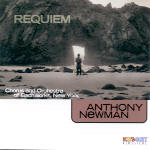Musical settings of the Requiem mass have a long and distinguished history in Western music, state the liner notes for Anthony Newman’s Requiem, going on to say that “. . . the great Roman church settings are certainly those of Mozart and Verdi.” The “lesser known” versions by the likes of Berlioz, Bruckner, and Dvorák are mentioned, as are more “modern” settings like those by Hindemith and Britten. The next composer mentioned is, of course, Anthony Newman (the man who gave us the O.J. Simpson opera in 1998), and Newman is familiar with the lineage from whence he springs. Much too familiar: he apes it directly at every turn. This Requiem is less a composition than a really spectacular mimetic musical exercise that shows a composer who has a thorough grasp of past form and harmony and an excellent ability to write in the “style of”–but who has little original to say.
The opening Requiem Aeternam sounds disturbingly similar to the opening of Bach’s St. John Passion, and the imitations carry on: Newman’s Dies Irae equals Verdi’s Dies Irae, his Kyrie is Mozart’s Kyrie (though with a Bach ending), his Confutatis is Stravinsky’s. Newman’s cause is not aided by the acoustics: the voices sound like they are singing in another room, and solo instruments get lost in the fray–Graham Ashton’s Handelian trumpet solo on the Libera Me sounds chintzy and boxy, and Marc Heller’s strong tenor is difficult to hear through the dull, foggy ambience. When Newman performs his own organ interludes the sound becomes much clearer and brighter, and he handles these passages like the expert organist he is. On the whole, this disc smacks of a self-funded and cheaply produced recording of a piece that even fails to give Andrew Lloyd Webber’s Requiem a run for its money.
































